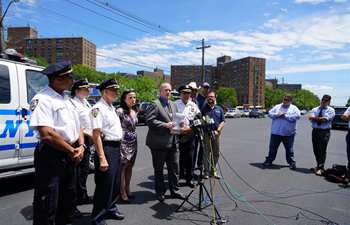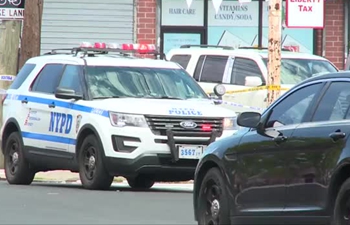WASHINGTON, June 22 (Xinhua) -- The U.S. Supreme Court on Friday ruled that police must obtain a search warrant to get access to cellphone location information in most cases.
The 5-to-4 decision, which reversed and remanded a previous ruling by the Sixth Circuit Court of Appeals, was immediately hailed as a major win for American privacy rights in the digital age.
However, the decision allows for warrantless cell-tower location information searches in emergencies and for national-security purposes.
Allowing police to obtain moment-by-moment tracking of an individual's cellphone location is a kind of surveillance that the framers of the U.S. Constitution did not want to occur without a search warrant, said Chief Justice John Roberts, who wrote the decision, joining the court's four liberals.
This sort of tracking information is akin to wearing an electronic ankle-bracelet monitoring device, said the chief justice.
Obtaining a warrant would have required the police to show a judge that they had probable cause to believe the phone records contained evidence of a crime.
The dispute dates back to a 2011 robbery in Detroit, after which police gathered months of phone location data from Timothy Carpenter's wireless provider. They pulled together 12,898 different locations from Carpenter over 127 days without a warrant, evoking the legal and privacy concern.
A Sixth Circuit Court of Appeals judge ruled that cellphone location information is not protected by the Fourth Amendment, which forbids unreasonable search and seizure, and therefore didn't require a warrant.
In the Supreme Court's ruling, Roberts wrote that the government's searches of Carpenter's phone records were considered a Fourth Amendment search.
"The Government's position fails to contend with the seismic shifts in digital technology that made possible the tracking of not only Carpenter's location but also everyone else's, not for a short period but for years and years," he wrote.
"As with GPS information, the time-stamped data provides an intimate window into a person's life revealing not only his particular movements, but through them his familial, political, professional, religious and sexual associations," said the chief justice, "These location records hold for many Americans the 'privacies of life.'"
"This is a groundbreaking victory for Americans' privacy rights in the digital age," American Civil Liberties Union attorney Nathan Freed Wessler, who argued the case, said in a statement.
"The Supreme Court has given privacy law an update that it has badly needed for many years, finally bringing it in line with the realities of modern life. The government can no longer claim that the mere act of using technology eliminates the Fourth Amendment's protections." said Wessler.













